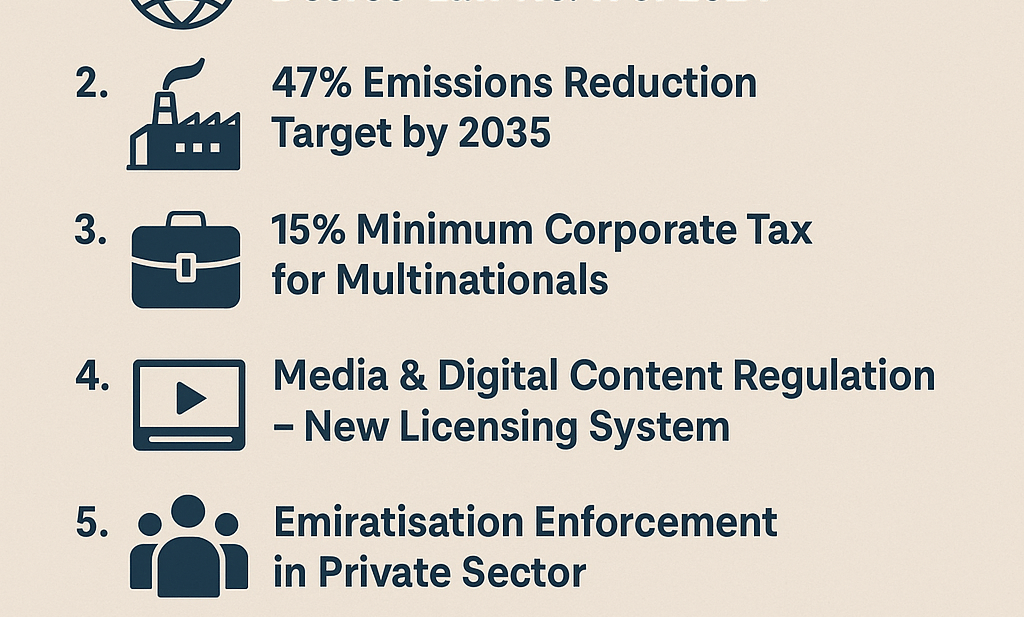Recent Regulations & Targets Set by the UAE Government (2025 Edition)
In 2025, the UAE government rolled out a series of bold regulations and national targets aimed at sustainability, economic competitiveness, digital governance, and workforce localization. These changes align with the country’s long-term vision for becoming a global leader in climate action, innovation, and socio-economic transformation.
1. Climate Law Enforced – Federal Decree‑Law No. 11 of 2024
The UAE enacted its first comprehensive Climate Law, mandating all businesses, including those in free zones, to measure and report Scope 1 and Scope 2 greenhouse gas emissions.
Key Highlights:
- Compulsory third-party verification of emissions reports
- Annual environmental reporting
- Strict penalties ranging from AED 50,000 to AED 2 million for non-compliance
- Focus on circular economy, innovation, and resilience-building
Purpose:
To accelerate the UAE’s Net Zero by 2050 target and fulfill its climate obligations under the Paris Agreement.
2. 47% Emissions Reduction Target by 2035
As part of its updated climate strategy, the UAE increased its ambition to reduce greenhouse gas emissions by 47% by 2035, compared to 2019 levels.
Why This Matters:
- Shows strengthened leadership after hosting COP28
- Encourages faster adoption of clean energy technologies
- Drives greater accountability across all economic sectors
3. 15% Minimum Corporate Tax for Multinationals
Starting January 2025, the UAE introduced a 15% minimum top-up corporate tax for multinational companies with global revenues of €750 million or more.
Impact:
- Aligns the UAE with global OECD tax reforms
- Helps generate non-oil revenue
- Promotes innovation with planned R&D and employment incentives
4. Media & Digital Content Regulation – New Licensing System
The government introduced a regulatory framework requiring influencers, publishers, content creators, and filmmakers to obtain a media license.
Key Rules:
- Applies to individuals and agencies across digital and traditional media
- Licensing fee structure introduced
- Penalties up to AED 1 million for publishing false or harmful content
Objective:
To create a more responsible and professional media ecosystem while maintaining national values and public trust.
5. Emiratisation Enforcement in the Private Sector
To boost national workforce participation, the Ministry of Human Resources made Emiratisation mandatory for private companies:
Updates:
- Companies with 50+ employees must ensure 1% of their workforce are UAE nationals by mid-2025
- For the first time, companies with 20–49 employees are also included under Emiratisation obligations
- Non-compliance results in fines and business restrictions
6. Flexible Work Policies During Summer
Under the initiative “Our Flexible Summer”, UAE government departments introduced flexible working hours from July 1 to September 12, 2025, for public sector employees in high-temperature regions.
Benefits:
- Safeguards employee health and well-being
- Increases work-life balance
- Enhances workplace productivity during extreme weather
7. Hydrogen Strategy Implementation
The UAE is scaling up its National Hydrogen Strategy, targeting:
- 1.4 million tonnes of low-carbon hydrogen production by 2031
- 15 million tonnes by 2050
This reinforces the country’s aim to become a leading hydrogen exporter and supports energy diversification.
8. Oil & Energy Strategy Update
While continuing to diversify into clean energy, the UAE has announced plans to increase crude oil production capacity to 5 million barrels per day by 2027, with scope for further expansion depending on market demand.
At the same time, under the Energy Strategy 2050, the country aims for:
- 75% clean energy share in the mix
- Retrofitting 30,000 buildings to boost energy efficiency
Summary Table
| Regulation / Initiative | Key Highlights |
| Climate Law | Emissions reporting, penalties, and net-zero alignment |
| Emissions Reduction Target | 47% reduction by 2035 (baseline 2019) |
| 15% Corporate Tax | For global firms with €750M+ revenue |
| Media Licensing Regulation | License required; AED 1M penalty for violations |
| Emiratisation Expansion | Mandatory for 20+ employees companies |
| Flexible Summer Work Policy | July–Sept, public sector, heat management |
| Hydrogen Strategy | 15 Mtpa target by 2050; energy export focus |
| Oil Capacity Growth | 5–6 million bpd by 2027; balancing clean energy strategy |
Conclusion
The UAE’s recent regulatory updates are not just compliance measures, they are strategic steps toward a more sustainable, diversified, and globally respected economy. By aligning with international standards in climate, tax, and governance, the country is future-proofing its growth model for generations to come.


